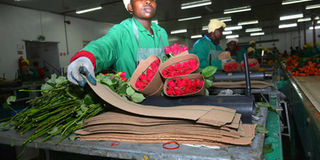Follow the strict rules of the European market and reap big as small farmer

European consumers apart from looking for food that’s healthy, also look for fresh produce that’s ethically sourced and traded. FILE PHOTO | NMG
What you need to know:
- European countries under the umbrella Euro-Retailer Produce Working Group drafted good agricultural practices to eliminate the frequent outbreak of plant and animal disease in 1997.
- Furthermore, being a member is voluntary, but a mandatory requirement if you want to export produce specifically to Europe market.
- The producers are given a GLOBALGAP document that entails a list of control points, compliance criteria, and checklist for the auditors.
- Moreover, farmers’ fresh produce are able to fetch premium price in the market. And, there is increase in consumer confidence in specific brand because of the product attributes.
The European Union forms a large proportion of market for Kenya and other sub-Saharan countries’ fresh produce (vegetables, fruits and flowers).
The sole responsibility lies with the producers and retailers (both in supermarkets and hypermarkets) who ensure the fresh produce is of high quality and meets the safety standards set.
European consumers apart from looking for food that’s healthy, they also look for food that’s ethically sourced and traded.
With many exporters from Kenya, and other sub-Saharan countries striving to enter the European market, getting GLOBALGAP certification is a viable option to have a competitive advantage.
If food quality and safety procedures such as GLOBALGAP, are not embraced and implemented across agricultural value chain, not only will this affect the brand reputation but also the safety of food is jeopardised, and ultimately the consumers are affected.
What is GLOBALGAP?
European countries under the umbrella Euro-Retailer Produce Working Group drafted good agricultural practices to eliminate the frequent outbreak of plant and animal disease in 1997.
The formulated practices (EUREPGAP) consisted of both Hazard Analysis and Critical Control Point (HACCP) and Good Agricultural Practices (GAP).
These, were, critical in safety management across the agricultural value chain. Due to globalisation of the economies and increase in demand of fresh produce, EUREPGAP changed to GLOBALGAP, in 2007.
GLOBALGAP is internationally recognised standards and guidelines that address, food safety, labour, environmental protection, and animal welfare.
Furthermore, being a member is voluntary, but a mandatory requirement if you want to export produce specifically to Europe market.
Certification of individual farmers and working groups is upon meeting the set conditions.
Once certified, it guarantees the products are of high quality, sustainable, safe for consumption and available on every supermarket/hypermarkets in Europe.
Getting GLOBALGAP
The procedure of obtaining GLOBALGAP certification involves a producer being audited by an internationally recognised certification body.
The producers are given a GLOBALGAP document that entails a list of control points, compliance criteria, and checklist for the auditors.
The certification body has to audit the entire farm activities during the production process. Basically, it involves
• Training/consultancy: Learning about requirements to implement GLOBALGAP.
• Pre-audit certification: Identifying non-conformities, strengths and weaknesses of a specific value chain before the actual certification audit.
• Initial audit: Audit is performed by certification body.
• Follow-up audit: To renew your GLOBALG.A.P. Certificate by a certifying body.
Alternatively, you may have a farm assurer, an individual who is conversant with quality standards and safety guidelines.
He has first-hand knowledge about GLOBALGAP and standards required. He has customised solutions for consumers and is be able to link up with select customers in supply chain.
However, during GLOBALGAP implementation, some costs will be incurred which include investment in storage facilities, safety handling materials, packaging facilities, transport facilities, provision of running water, farming equipment and sanitary facilities.
Benefits of GLOBALGAP to farmers and consumers
Through GLOBALGAP certification, farmers and consumers are able to meet objectives such as commitment to food safety, food quality, social and environmental, production efficiency, and food security.
Moreover, farmers’ fresh produce are able to fetch premium price in the market. And, there is increase in consumer confidence in specific brand because of the product attributes.
Products that are categorised ‘organic’ and certified can also have a competitive advantage.
Generally, there is maximum output and quality control. When GLOBALGAP is well implemented, despite cost associated with it, small-scale farmers and retailers stand a chance to reap hugely in long run.
The writer is based at the Department of Dairy and Food Science and Technology, Egerton University.




